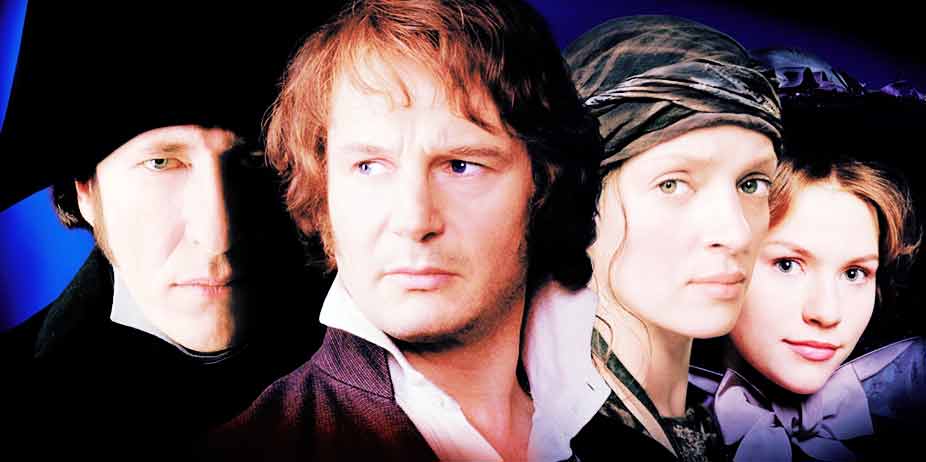
Les Miserables (1998)
There is no novel as gripping as Victor Hugo's Les
Misérables, the story of redemption, overzealous
fundamentalism (justice at all costs) and selfless
heroism. This is why it has been translated into
numerous languages and portrayed on Broadway,
television, in film a dozen times over. Jean Valjean has
been brought to the screen by many actors, but never
with quite the charisma and on-screen passion of
Oscar-nominated Liam Neeson. With a stunning cast, a
gorgeous soundtrack and a premise to touch even the most
hardened heart, this most recent adaptation is a
triumph. Jean Valjean (Liam Neeson) has spent nineteen
years at hard labor in a French prison for stealing a
loaf of bread. Once reaching the end of his sentence, he
is given a yellow passport (marking him as a former
convict) and told to report to his parole officer.
Wandering the lonely roads of France seeking redemption
for his corrupted life, Valjean meets the man who
forever alters his fate. After being turned away by all
the local inns in the parish, he finds warmth and food
at the church, by the invitation of its Bishop (Peter
Vaughan). Valjean repays him by stealing his silver, but
he is caught. Instead of judgment, he receives mercy...
and a new lease on life.
Ten years later, Inspector Javert (Geoffrey Rush) is
assigned to a new post in Vigau. The small town prospers
under the management of a good-hearted and kind mayor,
whom Javert believes is too lenient. Javert is convinced
he has seen the man before... perhaps in prison. This
stranger resembles a convict who broke his parole. In
the meantime, the mayor's overseer discovers one of the
women in their employment (Uma Thurman) is an unmarried
mother. Out of fear that Fantine may corrupt those
around her, the penniless woman is discharged. Left
without any other means, Fantine turns in to
prostitution to survive. The mayor takes pity on her and
not only removes the sentence, but gives her into the
hands of the church so she might be nursed back to
health.
These lives and more (including Claire Danes as
Cossette) will entwine in ways no one expects, and
leaves Valjean to make a choice between freedom and
escape. What unfolds is a touching story of renewed
faith and moral strength in a time of revolution and
cruelty. The transformed and godly Valjean is offset
well by the passionate, cruel Javert. They are two men
of conviction, but one allows for human failings; the
other makes no exceptions. This dramatic, powerful clash
of personalities and priorities provides the backdrop
for side-plots, such as Cosette's growth into maturity
and her love for a Revolutionist, Maraus.
When a friend told me this was her favorite film of all
time, I raised my eyebrows. A movie that mentions
prostitution and criminals on the back cover didn't
sound promising. How little I knew the value of this
film! The life-altering story teaches compassion, faith,
honesty, integrity, and self-sacrifice. Its entire
premise is built around the idea that a man can be
redeemed through faith. Lovers of the original book will
find it much altered (in many ways, I prefer this
adaptation to the novel) but it still captures the heart
and morality of Hugo's work. Les Misérables has romance,
action, suspense, and unforgettable performances. It
isn't especially pretty to look at, but that doesn't
matter... it's the storyline we care about.
Rush and Neeson create a truly astounding chemistry --
they're both brilliant actors and play off one another
superbly. Their verbal duels often spark with repressed
wrath. A dramatic score ads the depth of character
development while humor is carefully woven into a
serious and captivating plot. Les Misérables is a
wonderful film, and if you look past the obvious you'll
discover a story capable of changing your life. This is
a a tale of compassion, honesty, transformation,
morality, and forgiveness that might not adhere exactly
to Victor Hugo's book, but still leaves one with a sense
of betterment. And it's not often one can say that about
a film.
Sexual Content:
Fantine wears revealing clothing; men put snow down her
dress and speak to her in vulgar terms. She throws off
her coverlet, revealing her bare legs and stomach
(nudity is avoided), as she offers to repay her
landlord.
Language:
A few mild profanities and abuses of deity; prostitutes
are referred to as "whores."
Violence:
Men and women are shot down, executed, and fired at. A
child is killed in a crossfire. A man threatens a woman
with a gun. A man's head is bashed against a wall
several times, with bloody results. A character commits
suicide by allowing himself to drown. Men slap a
prostitute to the ground.
